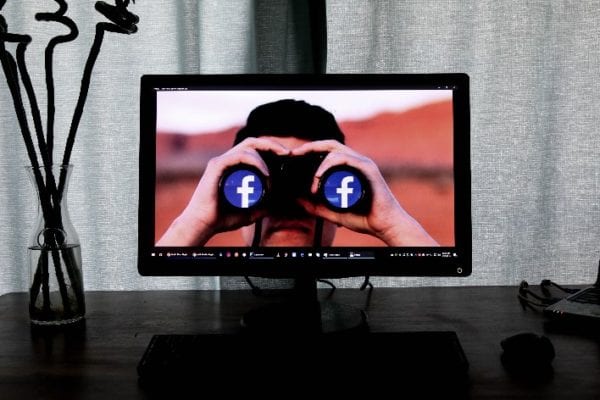
In an era where increased partisanship is easily palpable through society’s inundated media landscape, social media users are taking advantage of a corner of the internet where they can cultivate a like-minded community— secret Facebook groups. Unlike a “closed” Facebook group, a user can only gain access to a secret or privately hidden group by invitation. The invitation-only caveat for secret groups means these groups are not easy to find through simple searches. Some groups are small in size, composed of only a handful of members, while other groups have accumulated millions of members. Examination of secret groups seemed to take off leading up to and in the aftermath of the 2016 presidential election.
In October 2016, Maine voter Libby Chamberlain founded “Pantsuit Nation,” a secret Facebook group created to celebrate presidential nominee Hillary Clinton. According to The New York Times, the page reached over two million members in just three short weeks. Chamberlain described to the Times the make-up of the Facebook group: “We have lifelong Republicans who are voting for Hillary, lefty liberals and everything in between. People are chiming in from around the world” (Correal, 2016). Users of the group see it as a way for people to escape the possibility of pushback and rush of judgement for their political and social opinions. Unification also plays an important role. According to the Times, the group received a plethora of posts from members posed in pantsuits on Election Day 2016 while casting their vote for who would have been the first woman president.
David Weinberger, a researcher at Harvard University, said private corners of the internet such as secret Facebook groups may have a positive side: “Our ideas, our feelings, our values, develop primarily in the company of people who we trust, where we can speak frankly, where we don’t have to make explicit our assumptions and our values, where we have the freedom to talk in small and big ways about things that really matter,” (Dreyfuss, 2017).
Although these secret groups provide a virtual safe space, in the context of politics critics see them as also raising some red flags. Some may be concerned that these groups go against the democratic ideal of community among individuals who hold diverse views, and that they further contribute to community fragmentation through a retreat to echo chambers. For example, when reporting on the repercussions of secret political Facebook groups, Wired reporter Emily Dreyfuss was added to a secret group formed by pro-Clinton voters during the 2016 Democratic primaries. Clinton supporters formed the group to air their grievances about Bernie Sanders’ supporters. However, even after the 2016 election, when it wasn’t clear if Sanders would run again in 2020, the page continued to direct its ire at Sanders: “The people in the group get each other fired up, egg each other on to disown friends who support Sanders’ initiatives in congress, and largely ignore posts that try to move the conversation away from this now tangential political figure” (Dreyfuss, 2017). One might worry that these secret Facebook groups, foster a sense of community only by shutting out conflicting opinions.
Another side effect of these secret groups is the potential of enabling misinformation. According to The Washington Post, “Misinformation experts have repeatedly pointed out that people in like-minded groups are less likely to flag one another’s content as problematic” (Dwoskin, 2019). Because these groups are hard for the outside world to detect, they are not vulnerable to the same monitoring access as public groups, and they are not readily accessible to the everyday person who could provide facts and counterarguments to negate misinformation. These concerns are not hypothetical. In August 2019, Facebook announced an update to group privacy settings in conjunction with its Safe Communities Initiative to combat misinformation and secret groups that become “gathering places for racist, offensive activity” (Lee, 2019).
The outward benefits of social media are evident in the fact that they help to generate a sense of connectedness with often-distant others. However, in the context of secret Facebook groups, the question arises: should we find ways to interact with those who share our deepest political commitments, or should we seek out those with whom we strongly disagree?
Discussion Questions:
- What are some of the benefits of secret, or hidden, Facebook groups?
- What are the ethical issues that arise from participating in a secret Facebook group?
- How might a secret Facebook group be different from a physical in-person organization or club created to support like-minded individuals? Would the same ethical issues arise? Why or why not?
- Would Facebook getting rid of the secret Facebook function be good for democracy? Why or why not?
Further Information:
Correal, Annie. “Pantsuit Nation, a ‘Secret’ Facebook Hub, Celebrates Clinton.” The New York Times, November 8, 2016. Available at: https://www.nytimes.com/2016/11/09/us/politics/facebook-pantsuit-nation-clinton.html
Dreyfuss, Emily. “Secret Facebook Groups Are the Trump Era’s Worst, Best Echo Chamber.” Wired, January 20, 2017. Available at: https://www.wired.com/2017/01/secret-facebook-groups-trump-eras-worst-best-echo-chamber/
Dwoskin, Elizabeth. “‘Facebook says private groups are its future. Some are hubs for misinformation and hate.” The Washington Post, July 5, 2019. Available at: https://www.washingtonpost.com/technology/2019/07/05/facebook-says-private-groups-are-its-future-some-are-hubs-misinformation-hate/
Engel, Pamela. “‘People want it to be true’: Inside the growing influence of a mysterious anti-Trump website.” Business Inisider, May 16, 2017. Available at: https://www.businessinsider.com/the-palmer-report-bill-louise-mensch-2017-5
Lee, Dami. “Facebook is simplifying group privacy settings and adding admin tools for safety.” The Verge, August 14, 2019. Available at: https://www.theverge.com/2019/8/14/20805928/facebook-closed-secret-public-private-group-settings
Silverman, C., Lytvynenko, J., & Thuy Vo, L. “How Facebook Groups Are Being Exploited To Spread Misinformation, Plan Harassment, And Radicalize People.” Buzzfeed News, March 19, 2018. Available at: https://www.buzzfeednews.com/article/craigsilverman/how-facebook-groups-are-being-exploited-to-spread
Authors:
Allyson Waller & Scott R. Stroud, Ph.D.
Media Ethics Initiative
Center for Media Engagement
University of Texas at Austin
November 18, 2019
Image: Glen Carrie / Unsplash
This case study is supported by funding from the John S. and James L. Knight Foundation. It can be used in unmodified PDF form for classroom or educational settings. For use in publications such as textbooks, readers, and other works, please contact the Center for Media Engagement.
Ethics Case Study © 2019 by Center for Media Engagement is licensed under CC BY-NC-SA 4.0



